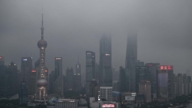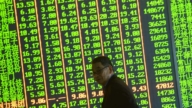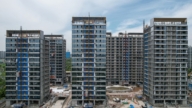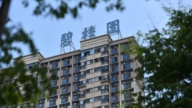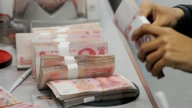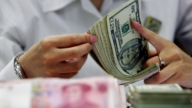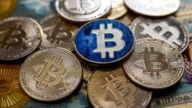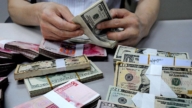【新唐人2013年10月26日讯】中国房价上涨到令人绝望,似乎没有什么能阻挡中国房价上涨的步伐,甚至连诺贝尔经济学奖获奖者席勒,也不敢轻言中国房地产的前景。那么,是什么原因使中国的房地产走向如此不确定﹖使这个泡沫越吹越大,而又不可戳破。我们看看专家分析。
根据国家统计局的数据,中国70个大、中城市9月房价同比上涨9.1%,涨幅高于8月的8.3%。在北京,新建商品住宅价格同比上涨20.6%。上海涨幅为20.4%,深圳涨幅20.1%。
一线城市10年来房价上涨了5倍﹔而另一方面,在一些地区,大量空房无人居住,出现诸多“鬼城”﹔在经济不景气的情况下,房价却一直飙升,使得众多经济学者警告,中国房地产崩盘预测失灵。
今年的诺贝尔经济学奖获奖者罗伯特•席勒(Robert Shiller),成功预测了2000年美国互联网的泡沫破裂、和2005-2007年的美国楼市危机、以及2008年全球金融海啸等。大家都希望席勒能够为中国楼市“诊脉”。但实际上,他对中国楼市的评论一直很谨慎。
几年前席勒曾表示,不论从房价收入比、房价租金比,还是从国际的横向比较、和历史纵向比较来看,中国楼市价格都处于相当高的水平。今年6月,他公开指出:中国等国家楼市急剧上涨,看起来存在泡沫。
事实上这个泡沫,今天看来却如此的坚硬,似乎没有谁再敢预测它何时破裂。
浙江大学商学研究院院长李志文:“共产党是个泡沫,房地产在共产党没有垮之前就是这个样子,政局一旦不稳,它就出现一个大泡沫,因为全是共产党现象造成的,土地是政府控制住的,有的就变成了人为的吸血性,如果土地完全市场化,它不至于涨成这么厉害。”
前几年,中共当局没有停止任何调控措施,但中共新政上任以来,没有针对房地产市场推出任何重大政策,评论认为,这令房地产市场蠢蠢欲动,担心政府政策可能导致房价下跌的潜在购房者又杀回市场。
中国房地产投资顾问郑志遥:“因为房价后面牵扯的行业很多,如果房地产将来要去泡沫化的话,那一个动荡下来,引起的结果不亚于金融海啸。”
房价上涨明显的中国大城市,生活成本也大幅窜升。据北京市统计局发布的数据,今年9月,北京市居民消费价格指数(CPI)同比上涨3.3%,食品、娱乐教育文化用品,以及服务价格涨势“凶猛”,分别达到5.3%和5.7% ,居住类价格同比上涨4.7%。
按照统计局的数据,住房租金相比上月100的基数,上升到104.5%,水电燃料上升到102%。住房租金北京连续上涨52个月,广州连涨48个月,深圳连涨51个月,如果以10年前的租金为基数,房租上涨了5倍以上。
大陆财经评论家叶檀撰文指出,房地产不是资金的沉淀池,相反,在房地产热潮期,房地产是资金泡沫的搅拌器,从房地产中生成源源不断的新货币,回流到套现者手中。
郑志遥:“真正那些赚钱的好的行业,都被那些玻璃门、防弹门挡着进不去,各种资本唯一允许你进去的就是房地产,国家的政策,各地对GDP的依赖,导致各路资金蜂拥进来。”
专家指出,在经济不景气的情况下,土地似乎成了目前中共唯一来钱的活水源。叶檀总结,城镇化建立基础设施,需要土地变现﹔农民要进城,需要土地变现﹔拆迁救助城市贫民,同样需要土地变现﹔地方政府的债务负担增加,可以偿债的手段没有任何变化,税收不行只有土地政策弥补。
叶檀质疑,以控制预售证的手段抑制房价,不过是一场自欺欺人的秀而已。
采访编辑/刘惠 后制/孙宁
House Prices Become China’s Life Water During Economic Downturn
China house prices are booming,
and it seems nothing can stop it.
Even Nobel Prize winner Robert Schiller has showed caution
towards predicting what will happen to China’s real estate.
Why is there uncertainty towards China’s real estate,
and that the bubble gets bigger without any puncture?
Let’s see the expert’s analysis.
According to the National Statistical Data Bureau in China,
house prices in large cities rose 9.1% in September 2013.
This is higher, in comparison to the 8.3% in August.
In Beijing, new commercial house prices rose 20.6%.
Shanghai rose 20.4%, with a 20.1% rise in Shenzhen.
House prices in first-tier cities
increased five times in 10 years.
On the other hand, there are now a large number of available
unoccupied houses, in what has been dubbed ghost towns.
Soaring house prices in economic depression made many
economists predict a failure warning for China’s real estate.
This year’s Nobel Prize winner Robert Schiller successfully
predicted the U.S. internet bubble bursting in 2000.
He also predicted the U.S. housing market crisis in
2005-2007, and the global financial tsunami in 2008.
Everyone is looking to Schiller, whether he can
diagnose the troubles of China’s housing market.
However, he has been very cautious
on commenting about this issue.
A few years ago, Schiller said that China’s
housing prices are at a very high level.
This is the case whether making comparisons internationally,
historically, or in terms of income ratio or rental ratio.
This June, he said publicly that there might be
bubbles in China and other countries’ housing market.
This is because of soaring house prices.
In fact, today’s bubble seems so hard that no
one would dare to predict when it could break.
Li Zhiwen, Dean of Zhejiang University Business
School: “The Chinese Communist Party is a bubble.
The real estate might become a bigger
bubble with an unstable political situation.
This is because it is caused by the
effect of the Communist Party.
Since land is under government’s control,
it intentionally becomes a hungry vampire.
If the land is fully market-oriented, it will not rise to this."
A few years ago, the Chinese authorities did
not use any control measures on real estate.
China’s New Deal is without major policies on real estate.
Potential buyers with concerns over house
prices falling are coming back into the market.
Mr. Zheng, China Real Estate Investment advisor:
“There are so many industries involved in house prices.
Breaking the real estate bubble will have
the same result as the financial tsunami."
Living costs have increased considerably
with the significant house price rises.
According to Beijing Statistics Bureau, in September
2013, Beijing’s consumer price index (CPI) rose 3.3%.
Food, entertainment and educational products
and services prices saw a strong rise.
These rises were 5.3% and 5.7%,
with housing prices rose 4.7%.
According Beijing Statistics Bureau, housing rental
prices rose to 104.5 %, compared to last month.
Water and gas fuel rose to 102%.
Housing rental rose for 52 consecutive months in Beijing,
48 months in Guangzhou and 51 months in Shenzhen.
Housing rental rose 5 times based
on rental prices from 10 years ago.
Ye Tan, a Mainland financial commentator points out
that real estate is not a money sedimentation tank.
On the contrary, it is the ‘real estate bubble blender’.
The new currency generated from real
estate to will give cash back to people.
Mr. Cheng: “The real lucrative industries
are blocked by those bulletproof glass doors.
This only allows real estate to become the focus
of capital, national policy, and local dependence
on GDP, which will lead to various problems."
Experts point out that land seems to be unique life water
for the CCP to make money during economic downturn.
Ye Tan concludes that land is needed to convert
into cash, in the construction of infrastructure, with
farmers moving and demolition of urban poor areas.
With the increase of local debt, there is no
way to pay debt, including tax only land.
Ye Tan questions whether it might be self-deception
to curb housing prices by controlling the sales permits.


